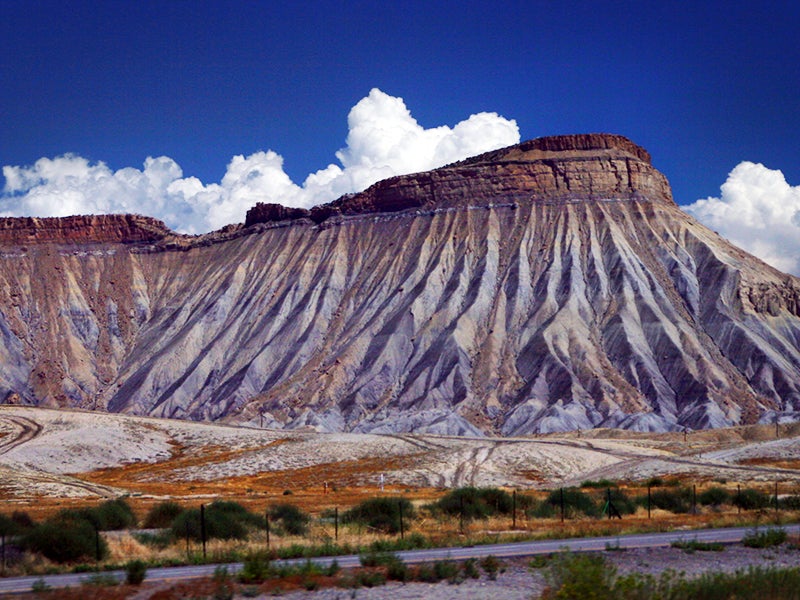Despite Climate Rhetoric, Obama Administration Boosts Dirty Oil Shale
A foreign company wants to build a strip mine and refining facility in Utah, and federal land managers are lending a hand.

This page was published 9 years ago. Find the latest on Earthjustice’s work.
Last month, with the stunning backdrop of Yosemite National Park behind him, President Obama described the havoc climate change is wreaking on national parks and other cherished natural areas. He called out those who talk about tackling greenhouse gas pollution, but do nothing to stop it:
But about 700 miles to the east of the president’s podium, in Utah’s remote Book Cliffs, federal land managers working appear to be ignoring that very same advice by preparing to pave the way for the development of a massive strip mine and industrial complex to burn rock and transform it into oil.
Enefit American Oil wants to establish the first commercial oil shale project in the U.S. in these desert cliffs. Oil shale is rock interlaced with a pre-petroleum goo that, if heated hot enough and long enough, can be processed into synthetic “shale oil” and refined into transportation fuel.
Enefit, a subsidiary of Estonian government-owned Eesti Energia, plans to strip-mine up to 9,000 acres for oil shale near the Green and White rivers, just a few miles west of the Utah-Colorado boarder. The oil giant hopes to produce 50,000 barrels of oil per day (18 million barrels a year) for up to 30 years. And the federal Bureau of Land Management (BLM) plans to to pave the way for the strip mine and refinery.
Oil shale is a particularly dirty fuel when it comes to air and climate pollution. Even Enefit admits that producing and burning a gallon of shale oil requires up to about 40% more energy (and thus carbon pollution) than a gallon of conventional oil, and more even than notoriously dirty oil sands. In addition the larger climate impacts of oil shale production, the refining plant would also add significant pollution to an area that, due to existing oil and gas drilling and winter inversions, already experiences severe smog.
Estonia’s plans would also degrade the environment because the company plans to use strip-mining to access the shale. Strip mining is a process that scours the landscape, leaving it barren of natural vegetation and native wildlife.
What’s more, mining and processing oil shale requires vast amounts of water—a particularly precious resource in the arid West. The proposed project would draw millions of gallons of water every year from the already stressed Upper Colorado River basin. This threatens imperiled fish species in the Colorado River whose future is already grim with climate change and increased human development, both of which are likely to reduce Colorado River flows even further. According to the BLM’s draft environmental impact statement, potential harm to endangered fish is “unavoidable” if the project goes forward as is.
While Enefit has not yet revealed a specific development plan for its mining project, BLM appears willing to approve the company’s rights-of-way over federal public land. This means that the BLM may allow Enefit to ignore the strip mine and refinery’s air, water, and climate damage by focusing instead on the relatively smaller degradation caused by bulldozing right-of-way corridors—an approach conservation groups, including Earthjustice, are saying violates the law.
Getting rights-of-way approval is critical for the project because the property Enefit plans to mine is an island of private property surrounded by federal public lands. The proposed rights-of-way would allow the company to build a transmission line for electricity and pipelines to move natural gas and water to the parcel, as well as a pipeline to transport the finished shale oil. Without the rights-of-way, the project would likely become significantly more expensive, as water and fuel may have to be trucked in and out.
Last month, the BLM closed the comment period on its draft environmental impact statement on the rights-of-way. Earthjustice joined 14 other conservation groups in submitting formal comments urging the Obama administration to deny Enefit access to the land on the grounds that the proposal is not in the public interest.
Earthjustice also helped collect 25,000 comments from concerned citizens. Here are just a few of the comments we received:
Earthjustice’s Rocky Mountain office protects the region’s iconic public lands, wildlife species, and precious water resources; defends Tribes and disparately impacted communities fighting to live in a healthy environment; and works to accelerate the region’s transition to 100% clean energy.